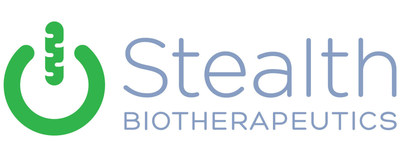Stealth BioTherapeutics Announces "Path Forward" Despite Disappointing Delay for Ultra-rare Barth Syndrome
- Following five years of discussions and a positive advisory committee recommendation, FDA proposes a potential accelerated approval pathway requiring resubmission of the elamipretide NDA
- Barth syndrome, a progressive, lethal, pediatric cardioskeletal disease often diagnosed at birth and with no approved therapies, affects ~150 individuals in the U.S.
NEEDHAM, Mass., May 29, 2025 /PRNewswire/ -- Stealth BioTherapeutics Inc. (the "Company" or "Stealth"), a clinical-stage biotechnology company focused on the discovery, development and commercialization of novel therapies for diseases involving mitochondrial dysfunction, today announced that the U.S. Food and Drug Administration ("FDA") has identified a potential path forward for elamipretide for the treatment of Barth syndrome following years of discussions with the Agency and a 2024 Cardiovascular and Renal Drugs Advisory Committee meeting ("Ad Com") that concluded that elamipretide is effective for the treatment of Barth syndrome.
The Company submitted data in its January 2024 new drug application ("NDA") showing that knee extensor muscle strength, which improved by over 45 percent in the Company's Phase 2 clinical trial, was significantly correlated with improvements on the six-minute walk test, an FDA-recognized indicator of clinical benefit. The Company proposed in its NDA and the FDA has now agreed to consider knee extensor muscle strength, for which the Company previously submitted data, as a potential intermediate clinical endpoint to support accelerated approval.
"We recognize that the FDA's recommendation for an accelerated approval for elamipretide in Barth syndrome offers a path forward for this incurable pediatric disease that affects an incredibly small number of individuals worldwide," said Reenie McCarthy, CEO. "Elamipretide, which targets the cardiolipin deficit central to Barth syndrome, is the only agent in clinical development to treat this ultra-rare disease for which the FDA has acknowledged that additional pre-approval randomized controlled trials are unfeasible. We hope the FDA will also prioritize ensuring rapid access for neonates affected by the disease subject to appropriate post-marketing safety monitoring. We are experiencing a sharp increase in emergency access requests for critically ill infants from medical experts worldwide following the recent publication of several positive case study reports."
Stealth received the FDA's complete response letter after a 16.5-month priority review cycle during which the FDA extended its review from January to April 2025 then missed its April 29 extended prescription drug user fee action date. The FDA also cited observations arising from a May 2025 CGMP surveillance inspection of a third-party manufacturing facility for elamipretide, although no specific deficiencies related to the elamipretide manufacturing process were identified. The FDA did not raise concerns with the clinical safety data, requesting only that a resubmission include any additional safety data collected since NDA submission. The Company will meet with the FDA next month to discuss the proposed post-marketing study, with which the Agency previously expressed alignment when originally proposed by the Company in 2022.
The regulatory pathway for this development effort has been complex, entailing four different FDA review divisions since data was first presented to the FDA in 2019. The ultra-rare nature of Barth syndrome, the FDA's reservations regarding the positive data from SPIBA-001, a Phase 3 natural history control study assessing the functional endpoints utilized in the TAZPOWER open-label extension, and the FDA's prior refusal to consider an accelerated approval pathway all contributed to the challenges of the review.
In its NDA submission, the Company proposed accelerated approval on the basis of a muscle strength intermediate endpoint to address the FDA's desire, echoed by several members of the Ad Com, to see additional confirmatory data. The FDA's decision to now consider this pathway offers hope for access to treatment for the U.S. Barth syndrome patient community, approximately 20% of whom already receive elamipretide under the Company's expanded access program. However, the Agency has expressed reluctance to extend the accelerated pathway to critically ill neonates, who comprise nearly two-thirds of the Company's expanded access program. Half of early deaths reported in this lethal pediatric disease occur by age one.
The FDA's recommendation to resubmit on the basis of this new advice will further delay the potential approval and launch of elamipretide. The Company has implemented a 30% reduction in its personnel to conserve resources to fund a potential NDA resubmission and avoid interrupting patients' access to elamipretide through the Company's expanded access program.
About Barth Syndrome
Barth syndrome is an ultra-rare genetic condition characterized by cardiac abnormalities leading to exercise intolerance, muscle weakness, debilitating fatigue, heart failure, recurrent infections, and delayed growth. The disease is associated with reduced life expectancy, with 85% of early deaths occurring by age 5. Barth syndrome occurs primarily in males and is estimated to affect one in 1,000,000 males worldwide or around 150 individuals in the United States. There are currently no FDA- or EMA-approved therapies for patients with Barth syndrome. Elamipretide has Orphan Drug, Fast Track, Priority Review, and Rare Pediatric Designation from the FDA and Orphan Drug Designation from the EMA for the treatment of Barth syndrome.
About Stealth BioTherapeutics
Our mission is to develop novel therapies to improve the lives of patients living with diseases of mitochondrial dysfunction. Our lead product candidate, elamipretide, is under review for Barth syndrome and in late-stage development for primary mitochondrial myopathy and dry age-related macular degeneration. We are also evaluating a topical ophthalmic formulation of our second-generation clinical-stage candidate, bevemipretide (SBT-272), for dry age-related macular degeneration, and have a deep pipeline of novel compounds under evaluation for rare neurological and cardiac disease indications.
Media Contact
Anna Stallmann Communications
Anna Stallmann
anna@annacomms.com
Investor Contact
Precision AQ
Austin Murtagh
Austin.Murtagh@precisionaq.com
![]() View original content to download multimedia:https://www.prnewswire.com/news-releases/stealth-biotherapeutics-announces-path-forward-despite-disappointing-delay-for-ultra-rare-barth-syndrome-302467718.html
View original content to download multimedia:https://www.prnewswire.com/news-releases/stealth-biotherapeutics-announces-path-forward-despite-disappointing-delay-for-ultra-rare-barth-syndrome-302467718.html
SOURCE Stealth BioTherapeutics Inc.


